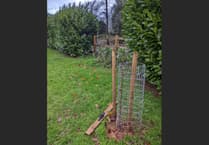FOLLOWING a trial of three-weekly waste collections over the summer, Mid Devon District Council is now moving forward with plans to implement the scheme throughout the district.
The three-month long trial, which began in July 2021, took place in Holcombe Rogus/Westleigh and an area around Canal Hill in Tiverton and involved more than 1,000 households having their residual waste (black sacks or bins) collected every three weeks. All other waste and recycling collections were unaltered.
At last month’s meeting of the Council’s Environment PDG, Members voted unanimously to approve the recommendation to introduce the three-weekly scheme across the district, with food waste collected weekly and dry recycling collected fortnightly (unchanged from existing collections).
Members of the Council’s Cabinet discussed the proposals on February 1.
The Cabinet resolved that Option 2 (three-weekly waste collections) be approved subject to officers considering alternative solutions for residual waste for properties where wheeled bins may not be an option, subject to a specific requirement to see a detailed plan to address the issues raised before full implementation.
The Cabinet Member for the Environment and Climate Change outlined the contents of the report highlighting the Waste Strategy, the need for change and the pilot scheme that had taken place for three-weekly waste collections over a three-month period across varied locations in the district. The proposal was not just about saving money but reducing residual waste and increasing recycling. He referred to the issue raised at the Policy Development Group with regard to wheeled bins not being an option and other alternatives that could be considered.
Consideration was given to:
• How residents would manage in built up areas to keep residual waste for three weeks • If dry recycling was increased whether this would impact on the capacity of the current fleet • Whether the trial results had improved recycling rates and whether the authority was losing income if residents used supermarket recycling skips or the recycling centres • Whether the authority were considering the recycling of soft plastics • Capacity issues and the provision of additional bins • Option 2 would bring the authority in line with the super aligned option documents in the Devon and Torbay Waste Strategy which would create opportunities for joint working in the future • The lack of detail in the Equality Impact Assessment and the need to consider the disposal of offensive waste • The various options available and whether a weekly recycling scheme could improve recycling rates • Officers would consider alternative solutions for properties where wheeled bins were not an option as part of the operational matters to be discussed in the action plan leading up to the implementation of the scheme • Project details could be presented to members via a briefing session. The reason for the decision was noted, that there was a need to consider that the current regime would ultimately incur additional costs to the Council, there was a need to consider options available to reduce costs and increase recycling rates. Councillors R J Chesterton and Mrs N Woollatt requested that their abstention from voting be recorded. The proposal will be discussed again by the Council before a final decision is made.
Mid Devon has not implemented any significant changes to its waste collections since 2015 and is now looking to follow many others local authorities, including neighbouring Somerset, who have successfully implemented three-weekly residual waste schemes.
By introducing three-weekly waste collections the Council says it will be able to improve recycling rates, decrease residual waste and in turn reduce the carbon impact and cut emissions from its collection vehicles.
It will also help the Council to meet with Government guidelines to recycle 65 per cent of household waste by 2035 and Devon’s proposed 60 per cent target rate by 2025.
If the scheme is approved the Council is looking to run a campaign in the Summer to bring awareness of the changes to Mid Devon residents, ahead of the implementation of the changes to customers during the Autumn.
Cllr Colin Slade, Cabinet Member for the Environment and Climate Change, said: “The trial has shown a significant reduction in the collection of non-recyclable waste in both urban and rural areas, which can only be a good thing for our district. I understand some people may be reluctant or have concerns about this potential change, but it has been proven to work to benefit the environment, with minimal impact on households.”
During the trial the Council saw a significant decrease in residual waste and a substantial increase in recycling of food waste.
Where customers used their own container or sacks in the urban trial setting, there was a 24 per cent reduction in residual waste collected, compared to a reduction of 44 per cent in the area where capacity was limited and wheelie bins provided.
Results from the rural setting are similar with customers who used their own receptacle or sacks reducing residual waste by six per cent and those with limited capacity (provided with wheelie bins) by 30 per cent.
In addition customers in the urban trial setting, who used their own containers or sacks, increased food waste recycling by 29 per cent and those provided with wheelie bins by 25 per cent and in the rural setting this increased by seven per cent and 15 per cent respectively. This increase in food waste recycling indicates that food waste was diverted from residual waste and is the main contributor to the impressive decline in residual waste found during the trial.
Customers involved in the trial were also consulted and results of this survey show 77 per cent of those who responded were either satisfied or very satisfied or neither satisfied nor dissatisfied with the three-weekly waste collection, while the remaining 23 per cent were dissatisfied or very dissatisfied.




.jpeg?width=209&height=140&crop=209:145,smart&quality=75)
Comments
This article has no comments yet. Be the first to leave a comment.